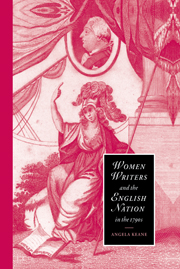Book contents
- Frontmatter
- Contents
- Dedication
- Acknowledgements
- Chapter 1 Introduction: Romantic belongings
- Chapter 2 Domesticating the sublime: Ann Radcliffe and Gothic dissent
- Chapter 3 Forgotten sentiments: Helen Maria Williams's ‘Letters from France’
- Chapter 4 Exiles and émigrés: the wanderings of Charlotte Smith
- Chapter 5 Mary Wollstonecraft and the national body
- Chapter 6 Patrician, populist and patriot: Hannah More's counter-revolutionary nationalism
- Afterword
- Notes
- Bibliography
- Index
- CAMBRIDGE STUDIES IN ROMANTICISM
Afterword
Published online by Cambridge University Press: 22 September 2009
- Frontmatter
- Contents
- Dedication
- Acknowledgements
- Chapter 1 Introduction: Romantic belongings
- Chapter 2 Domesticating the sublime: Ann Radcliffe and Gothic dissent
- Chapter 3 Forgotten sentiments: Helen Maria Williams's ‘Letters from France’
- Chapter 4 Exiles and émigrés: the wanderings of Charlotte Smith
- Chapter 5 Mary Wollstonecraft and the national body
- Chapter 6 Patrician, populist and patriot: Hannah More's counter-revolutionary nationalism
- Afterword
- Notes
- Bibliography
- Index
- CAMBRIDGE STUDIES IN ROMANTICISM
Summary
Let me make the novels of a country, and let who will make the systems.
Anna Laetitia Barbauld's closing thought in the prefatorial essay to the 1820 edition of The British Novelists – evidence if it were needed that women did and continue to participate in canon-building – encapsulates her simultaneously Romantic and utilitarian view of the novel and its relation to national culture. Adding another gloss on the well-documented ‘origin and progress of novel-writing’, Barbauld finds the signicance of the genre lies in its ubiquity: ‘Books of this description are condemned by the grave, and despised by the fastidious; but their leaves are seldom found unopened, and they occupy the parlour and the dressing-room while productions of higher name are often gathering dust upon the shelf.’ Whilst Hannah More was so alarmed by the easy circulation of these pernicious fictions that she took it upon herself to concoct a corrective diet, Barbauld finds in novels a benign, unsystematic form of cultural cohesion, which reflects and arbitrates the national character. As for the effects of their ready availability, Barbauld argues that whilst English novels have neither ‘flavour nor nourishment’ they are not ‘vicious’ nor ‘poisoned’, so the ‘chief harm done by a circulating library is occasioned by the frivolity of its furnishings, and the loss of time incurred’ (p. 55).
- Type
- Chapter
- Information
- Women Writers and the English Nation in the 1790sRomantic Belongings, pp. 159 - 162Publisher: Cambridge University PressPrint publication year: 2001

